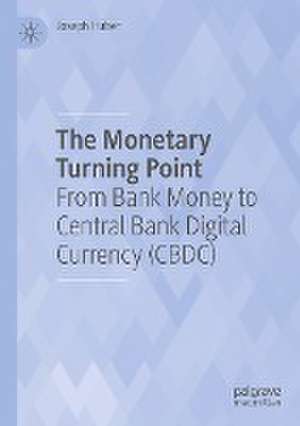The Monetary Turning Point: From Bank Money to Central Bank Digital Currency (CBDC)
Autor Joseph Huberen Limba Engleză Paperback – 18 feb 2024
| Toate formatele și edițiile | Preț | Express |
|---|---|---|
| Paperback (1) | 842.45 lei 38-44 zile | |
| Springer Nature Switzerland – 18 feb 2024 | 842.45 lei 38-44 zile | |
| Hardback (1) | 851.63 lei 17-23 zile | +83.42 lei 6-12 zile |
| Springer Nature Switzerland – 18 feb 2023 | 851.63 lei 17-23 zile | +83.42 lei 6-12 zile |
Preț: 842.45 lei
Preț vechi: 925.76 lei
-9% Nou
Puncte Express: 1264
Preț estimativ în valută:
161.22€ • 167.70$ • 133.10£
161.22€ • 167.70$ • 133.10£
Carte tipărită la comandă
Livrare economică 09-15 aprilie
Preluare comenzi: 021 569.72.76
Specificații
ISBN-13: 9783031239595
ISBN-10: 3031239598
Pagini: 192
Ilustrații: XIII, 192 p. 1 illus.
Dimensiuni: 148 x 210 mm
Ediția:1st ed. 2023
Editura: Springer Nature Switzerland
Colecția Palgrave Macmillan
Locul publicării:Cham, Switzerland
ISBN-10: 3031239598
Pagini: 192
Ilustrații: XIII, 192 p. 1 illus.
Dimensiuni: 148 x 210 mm
Ediția:1st ed. 2023
Editura: Springer Nature Switzerland
Colecția Palgrave Macmillan
Locul publicării:Cham, Switzerland
Cuprins
Chapter 1: Core points for introduction.- Chapter 2: Tree-tier monetary system. Types of money, their creation and circulation.- Chapter 3: Dominant money. The bank money regime.- Chapter 4: Monetary sovereignty. Bank money as para-sovereign fiat money.- Chapter 5: Historical turning points in the composition of the money supply.- Chapter 6: Today's recomposition of the money supply.- Chapter 7: CBDC System Design Principles.- Chapter 8: Central banks and monetary policy under conditions of CBDC.
Recenzii
“The book consists of eight chapters and covers a great deal of ground … . The Monetary Turning Point is one of the first book-length treatments to approach this issue from a systemic point of view and one of the first whose approach accords with post-Keynesian and financialization theory sensibilities. … As Huber notes though, currently central banks are being cautious. Reading Huber's book may help you have your say.” (Jamie Morgan, real-world economics review, Issue 107, 2024)
Notă biografică
Joseph Huber is Professor Emeritus of Economic Sociology at Martin Luther University, Halle Wittenberg, Germany. He is a pioneer of what is now known as ‘green ethical banking’ and is one of the founders of ecological modernization theory. He has written extensively on monetary policy and reform topics, is a longstanding policy advisor on matters of economic and ecological modernization and is actively involved in the international movement for monetary reform.
Textul de pe ultima copertă
The monetary system is at a turning point. The question is no longer if, but how soon countries will roll out a Central Bank Digital Currency (CBDC). This book discusses the recomposition of the money supply from the present bank money regime to a monetary system determined by CBDC. As the book sets out, the future of money is going to be digital and sovereign. Nonetheless, the relationship between the various types of money is competitive rather than being the peaceful coexistence that was officially envisaged. CBDC competes with the incumbent bank money as well as with private cryptocurrencies that are challenging both central-bank money as well as bank money. For technological and political reasons, bank money will not be able to emulate the superior properties of sovereign digital tokens. Uncovered and unwarranted cryptocurrencies, too, will not stand the competition in the long run. The shifts in the monetary system are changing the role of central banks in the interplay ofmonetary, fiscal and private-creditary functions and open up improved options for monetary policy. The book will be of interest to academics, researchers, and policymakers in monetary and financial economics, and digital currencies.
Joseph Huber is Professor Emeritus of Economic Sociology at Martin Luther University, Halle Wittenberg, Germany. He is a pioneer of what is now known as ‘green ethical banking’ and is one of the founders of ecological modernization theory. He has written extensively on monetary policy and reform topics, is a longstanding policy advisor on matters of economic and ecological modernization and is actively involved in the international movement for monetary reform.
Caracteristici
Presents a new dominant money paradigm Discusses the transformation of the monetary system from bankmoney to central-bank digital currency (CBDC) Analyzes the dynamics of the current recomposition of the money supply
